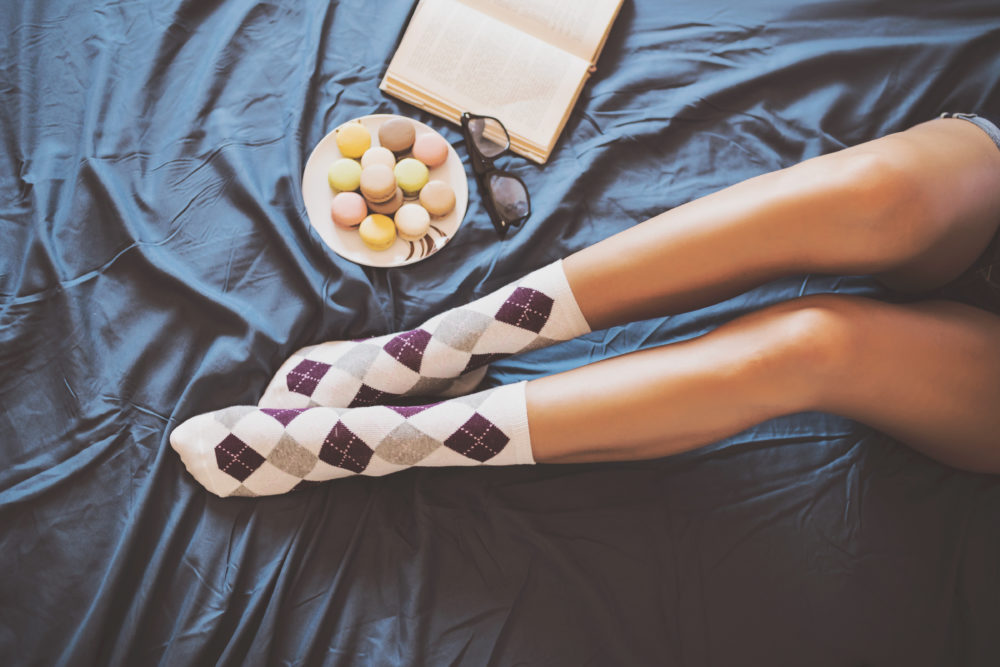
By Kathleen Fatica
Falling asleep aglow in electronic light has become an accepted part of life for millennials. When I first came to college at DePaul University, I was disturbed to find that my roommate fell asleep with Netflix playing right next to her face every single night. Throughout the year, though, I realized we weren’t so different. While she was watching Game of Thrones on her laptop while drifting off, I used my phone in my bed. Sometimes, I just left it on my mattress when I decided to sleep, just like 95% of Americans.
Inspired by the research I discovered about the harmful effects of blue light on sleep after my own difficulties with low sleep levels, which affected my immune system, I knew I wanted to stop using electronics before bed, but didn’t want to shirk a routine altogether. While brainstorming, I fondly remembered my pre-bed routine growing up – reading Meg Cabot books until my eyelids got heavy. Feeling nostalgic, I decided to try an experiment and read before bed in an attempt to get to sleep faster (and reignite my love for reading).
The book I chose for this experiment was The Circle by Dave Eggers. I chose this book because I was really excited to read it and discover what so many of my teachers and peers had been raving about. This meant I had a higher chance of sticking with reading, even when it felt unnatural.
The first few nights were pretty surreal. I walked into my dorm to see my roommate, as usual, watching a show with her computer screen inches from her half-shut eyes. I plugged my phone into my charger which I’d moved from bedside to under my desk, where I wouldn’t be able to reach or see it. As I backed away from my phone, I felt an uncomfortable sensation in my stomach, but left and snuggled into bed with The Circle. I set a goal for myself of 20 pages – a fair amount, but not too ambitious. When I reached page 20, I was still fairly awake, but shut my eyes and waited for sleep to come. During these first few days, I noticed the hard part. Since I didn’t have my phone in bed, I would miss late-night group message conversations. However, my fear of missing out was heavily outweighed by the benefits of my experiment.
As I went on, however, the unnatural feeling left me and I looked forward to reading in bed. Eventually, it became a habit and it took me much less time to fall asleep.
Additionally, I felt better about myself, because each night I was accomplishing something. I’m a person who gains energy from getting things done, and lives for the thrill of checking something, no matter how small, off my to-do list. While social media feeds can serve as valid streams of information or introspection, I have never felt accomplished after reading 100 tweets, the character equivalent to 16 pages of a standard novel. I did feel accomplished, however, from reading about 20 pages a night.
From the experiences I gathered in my experiment, reading before bed was a wonderful idea. It’s definitely hard, though, so if you’d like to try it don’t be too hard on yourself if for the first few nights you hover over your phone frantically checking every notification before you cut yourself off. As a book-lover, I have always questioned why I didn’t read as much as I used to but never followed through. This experience showed me that with some commitment and patience, you can get back in the groove of reading again in a way that benefits sleep and self-esteem. Now that’s wellness.
ABOUT THE AUTHOR
Kathleen Fatica is a freshman at DePaul University working towards a degree in Creative Writing and Public Relations. Before she joined The Culture-ist, Kathleen worked as an editor and writer for student newspapers at DePaul University including Her Campus DePaul and The DePaulia. When she’s not busy writing or editing, Kathleen enjoys listening to female rappers and color coding her planner while she city-hops her way across the globe. You can find her on Twitter and Instagram at @kathleeen2102
Reading photo via Shutterstock.


